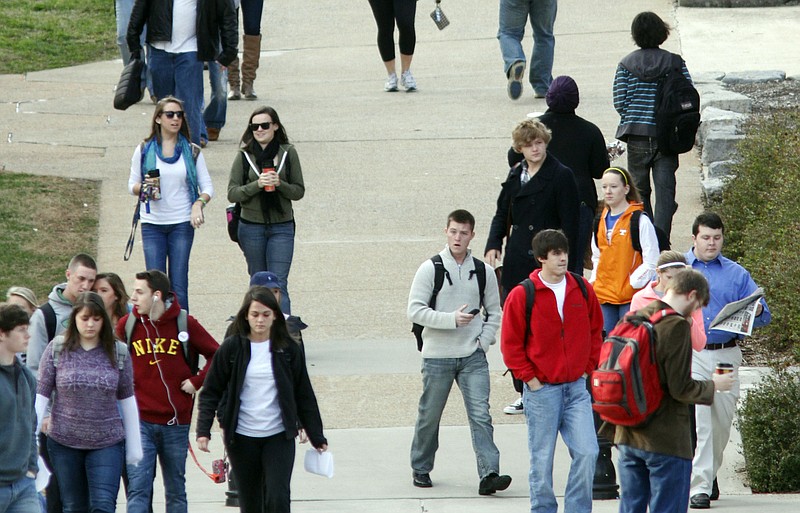PROPOSED UTC CHANGESTuition increase proposal• 6 percent tuition increase to $5,722 or $7,212, including feesRequire board of trustees approval• Facilities match fee -- $50, expected to generate $650,000• Athletic fee -- from $360 to $480, a 33.3 percent increase estimated to generate almost $1.3 million.• Increase tuition for the Executive MBA programs from $36,000 to $44,000 for in-state and from $40,000 to $49,000 for out of state.Needs president's approval• Special course fee of $50, estimated to generate $30,000Requires chancellor approval• North Campus housing cost -- From $3,360-$5,460 to $3,478-$5,650, a 3.5 percent increase, estimated to generate $187,364.• Stagmaier Hall housing cost (will reopen this fall) -- $3,800, expected to generate $524,400.• Parking decals -- From $108-$284 to $120-$316, a 10.4 percent increase expected to generate $86,604.• Meal plans -- From $328-$1,313 to $341-$1,365, a 4 percent increase, expected to generate about $800,000.Source: UT systemWHERE THE NEW MONEY GOESIf approved, the 6 percent tuition increase is expected to generate more than $3 million.• $900,000 will pay for the share of a 2.5 percent across-the-board salary increase not funded by state appropriations, and a 0.5 percent merit increase.• $408,000 is allocated to offset cuts in state operating funds.• $1 million is for instruction for faculty promotions and stipends and full-time faculty added due to enrollment growth.• About $700,000 is for higher utility costs and for support, maintenance and operations personnel.Source: UT system
UTC students may come back this fall with a higher tuition sticker price and a wide array of fee increases.
Under proposals being voted on today by the University of Tennessee Board of Trustees at their annual meeting in Knoxville, a full-time in-state freshman will pay a total of $7,212 a year, up from $6,718.
The vote affects all UT system campuses.
Fee increases proposed for the University of Tennessee at Chattanooga include raising the athletics fee by 33 percent, from $360 to $480. If approved, athletics fees will have increased 81 percent since fiscal 2009.
UTC Chancellor Roger Brown said the school didn't have an athletics fee for many years.
"But I don't anticipate to add to the athletic fee for a number of years because we believe we need to do a better job raising private money and attracting fans," he said Wednesday after the board meeting. "This is just to get us to a point where we are sustainable as a department."
Students also face a new $50 facilities match fee, expected to generate $650,000 to provide matching funds for capital projects.
Since 2008-09, tuition and fees at UTC have increased about 35 percent.
And if approved by Brown, students living in North Campus housing will pay about 3.5 percent more. The money will help pay for utilities, repairs and renovations, among other expenses, records show.
UTC students have seen tuition and fees increase pretty much every year in the past decade, said Brown.
"I feel awful for families to think that there is one expense that has to go up every year," he said. "That's the dilemma we face, trying to keep the quality high while losing state resources and while there's some level of inflation happening that we have to continue to ask for tuition increases."
UTC is not alone. The University of Tennessee in Knoxville is proposing a $20 library fee; an 18.5 percent increase in the facility fee to $320; a $10 hike in the application fee and a 6 percent increase for meal plans and housing.
A 6 percent tuition increase is proposed for UT-Martin and an 8 percent hike for UT. The total tuition and fee increase is 8.3 percent at Knoxville, 5 percent at UT-Martin and 7.4 percent at UTC.
Across the UT system, the higher costs will generate $29.4 million to help fund salary adjustments, scholarships, classroom infrastructure, academic promotions and student support services, according to information given the board.
Bradley Bell, UTC student body president, said the tuition increase is needed as the university continues to grow.
"The proposed 6 percent increase is not a high increase. I believe in our administration and have complete faith that the money that will be allocated from the tuition increase will return back to our students at this university," Bell wrote in an email.
About 48 percent of unrestricted revenues for schools come from tuition and fees, compared to 39 percent from state appropriations, figures show.
All told, proposed state higher education funding is $431 million for fiscal 2013, compared to $509 million in 2008.
"Institutions like us depended so heavily on state revenues until about 2007," said Brown. "Now we have this financial pressure that has pushed the level of dependence on tuition and fees and I don't see any change in that in the near term."
But tuition and fees at UT system schools are competitive to similar institutions even after proposed increases, according to materials presented to the board.
"The board is aware of the demands placed in students and parents in Tennessee for higher education," said James Hall, a trustee from Chattanooga.
" UTC remains one of the best buys in higher education, but at some point, it will have to be carefully evaluated how we can provide some stability going forward for families."
